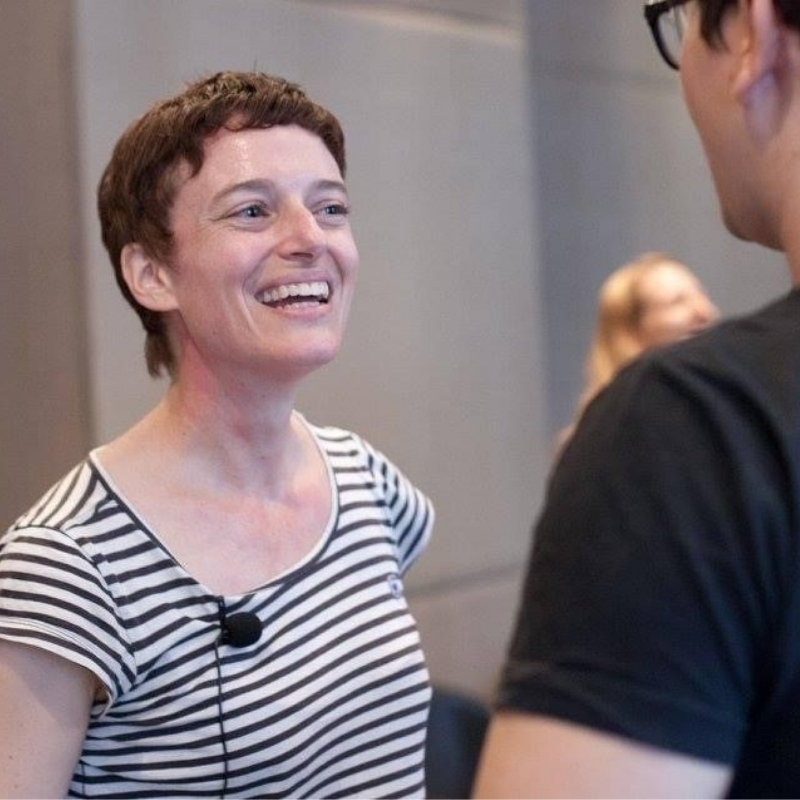In Memoriam: Professor Catherine Silverstone
Professor Catherine Silverstone
(17 December 1974 - 4 October 2020)
Professor Catherine Silverstone was a longstanding and much-loved colleague in the Department of Drama. She passed away on Sunday 4 October 2020 after a short illness.
Catherine grew up in Hamilton, New Zealand and attended a local state secondary school. She studied for a BA in English with Philosophy and MA in English at the University of Waikato and moved to the UK to undertake doctoral research at the University of Sussex. After graduating, Catherine was a Lecturer in English and Drama at Anglia Ruskin University in Cambridge before joining Queen Mary in 2007 as a Lecturer in Drama, Theatre and Performance Studies.
Catherine was an esteemed scholar of contemporary queer and decolonial approaches to Shakespeare; she also published on LGBT culture more broadly, including in relation to club performance, performances of queer affirmation, "queer afterlives", and the films of Derek Jarman.
Those of us who had the pleasure to work with Catherine knew her to be a wonderfully intelligent and intuitive thinker, a brilliant doctoral supervisor, and a generous, warm, and committed teacher.
Catherine was Head of the School of English and Drama from January 2020.
She was awarded a posthumous Professorship in March 2021.
Research
Catherine's research was concerned with the cultural politics of contemporary performance. She was particularly interested in what performance is asked to do (and for whom) and what’s at stake in the representations that it offers, especially for thinking about identity, community, and spectatorship. One of the key ways Catherine explored these concerns is through an investigation of early modern drama in performance on stage and screen; she also considered other types of performance, including queer performance, filmmaking, and live art.
Catherine's monograph, Shakespeare, Trauma and Contemporary Performance (2011, paperback 2014) explored relationships between performances of Shakespeare and various traumatic events and histories including apartheid, colonisation, homophobia, and war. She was the editor of a special issue -- ‘On Affirmation’ -- for Performance Research with Fintan Walsh (2014); a special issue of Shakespeare Bulletin to commemorate the 20th anniversary in 2014 of the death of the filmmaker, writer, painter, activist, and gardener, Derek Jarman; and Titus Andronicus (Q1 and F) for The Norton Shakespeare (2015). Catherine also published articles on theatrical reconstruction, cross-dressing, post-apartheid performance, Shakespeare in Aotearoa New Zealand, festival performance, queer club performance, and coming-out films. She was co-editor with Sarah Annes Brown of Tragedy in Transition (2007). Catherine was an active member of the editorial board of Shakespeare Bulletin.
She was a a founder member of the Sexual Cultures Research Group in the School of English and Drama, which actively fosters and develops cross-disciplinary conversations about methodologies, cultures, texts and objects, and research outputs related to sexuality, sex, gender, identity, and both intimate and public cultures.
Publications
Book
Shakespeare, Trauma and Contemporary Performance (New York: Routledge, 2011; paperback 2014)
Scholarly edition
Titus Andronicus, Q1 and F, The Norton Shakespeare, eds. Stephen Greenblatt. Vol. eds. Walter Cohen, Suzanne Gossett, Jean Howard, Katharine Eisaman Maus and Gordon McMullan, 3rd edn. (New York: W. W. Norton, 2015), pp. 491-554
Edited book and special issues
ed., Derek Jarman and ‘the Renaissance’, Spec. issue of Shakespeare Bulletin, 32.3 (2014). ISSN 1931-1427
with Fintan Walsh, eds., On Affirmation. Performance Research 19.2 (2014). ISSN 1352-8165
with Sarah Annes Brown, eds, Tragedy in Transition (Oxford: Blackwell, 2007)Selected articles and chapters
‘Survival as Legacy: Eulogy for The Sissy’s Progress’ (2017). Also displayed as part of the Museum of the Sissy that accompanied Nando Messias's performance Where 4 Roads Meet: Death and the Sissy at Toynbee Studios, London, 12 October 2017.
'Image Containers: Julia Bardsley’s media series', ‘u’ see the image of her ‘i’: Pinhole Photographs by Julia Bardsley (London: ear eye gym press, 2015).
'Lois Performs in Aotearoa New Zealand', The Only Way Home is Through the Show: The Performance Work of Lois Weaver, eds. Jen Harvie and Lois Weaver (London and Bristol: Live Art Development Agency and Intellect, 2015).
'Textual Editing', Contemporary Theatre Review 25.1 (2015), 64-67. DOI: 10.1080/10486801.2015.992244‘Remembering Derek Jarman: Death, Legacy, and Friendship’, Derek Jarman and ‘the Renaissance’, Spec. issue of Shakespeare Bulletin, 32.3 (2014), 451-70, DOI: 10.1353/shb.2014.0045
‘Festival Showcasing and Cultural Regeneration: Aotearoa New Zealand, Shakespeare’s Globe and Ngākau Toa’s A Toroihi rāua ko Kāhira (Troilus and Cressida) in Te Reo Māori’, Shakespeare Beyond English: A Global Experiment, eds Susan Bennett and Christie Carson (Cambridge: Cambridge University Press, 2013), pp. 35-47.
'Shakespeare, Cinema and Queer Adolescents: Unhappy Endings and Heartfelt Conclusions', Shakespeare (2013), 1-19: DOI:10.1080/17450918.2013.807297
‘Duckie’s Gay Shame: Critiquing Pride and Selling Shame in Club Performance’, Contemporary Theatre Review, 22 (2012), 62-78 DOI:10.1080/10486801.2011.645234
‘Fatal Attraction: Desire, Anatomy and Death in 'Tis Pity She's a Whore’, in 'Tis Pity She's a Whore: A Critical Guide, ed. L. Hopkins (London: Continuum, 2010), pp. 77-93
‘Speaking Maori Shakespeare: The Maori Merchant of Venice and the Legacy of Colonisation’, in Screening Shakespeare in the Twenty-First Century, ed. M. T. Burnett and R. Wray (Edinburgh: Edinburgh University Press, 2006), pp. 127-145
‘Shakespeare Live: Reproducing Shakespeare at the 'New' Globe Theatre’, Textual Practice, 19 (2005), 31-50 DOI:10.1080/0950236042000329636
For more information: see Catherine Silverstone's Queen Mary Research Publications profile
